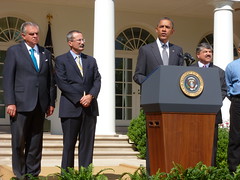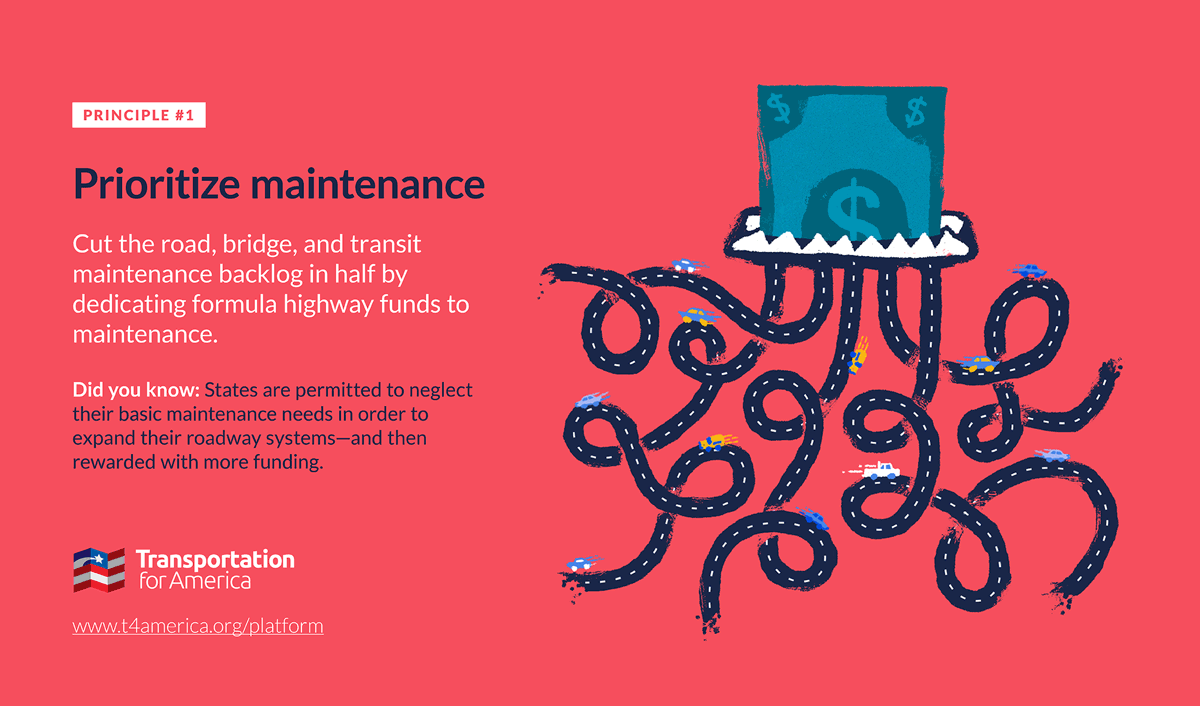700 days since expiration of last transportation bill, Congress urged to pass an extension
 President Obama gave a short speech in the Rose Garden this morning calling on Congress to come together quickly to pass a “clean” extension of the federal transportation bill to ensure that there’s no interruption in federal funding for transportation projects while they debate a longer-term reauthorization.
President Obama gave a short speech in the Rose Garden this morning calling on Congress to come together quickly to pass a “clean” extension of the federal transportation bill to ensure that there’s no interruption in federal funding for transportation projects while they debate a longer-term reauthorization.
At the end of September, if Congress doesn’t act, the transportation bill will expire. This bill provides funding for highway construction, bridge repair, mass transit systems and other essential projects that keep our people and our commerce moving quickly and safely. And for construction workers and their families across the country, it represents the difference between making ends meet or not making ends meet.
If we allow the transportation bill to expire, over 4,000 workers will be immediately furloughed without pay. If it’s delayed for just 10 days, it will lose nearly $1 billion in highway funding — that’s money we can never get back. And if it’s delayed even longer, almost one million workers could lose their jobs over the course of the next year.
As a refresher, we’re currently on the 7th extension of the 2005 transportation bill (which incidentally expired exactly 700 days ago today in September of 2009.) The current extension of federal law expires at the end of September, leaving only a narrow window of time for the House and Senate — currently far apart on policy and funding levels — to come together on a new long-term transportation bill.
A “clean” extension would mean extending the old policy without making policy changes or tweaks — changes that don’t have time to be properly considered or debated. T4 America Director James Corless said in our statement earlier today:
Extending the gas tax and the current law that allocates transportation funds ought to be the bipartisan no-brainer it has been historically. To play politics with the extension would deliver a gratuitous shock to a struggling economy and to families relying on infrastructure-related paychecks.
Extending the old policy is urgently needed, but it’s still a band-aid. The bigger need will still remain: passing a robust, long-term transportation bill with updated policy and purpose that matches the needs of the 21st century in America. Corless continued:
Beyond that, the President is right to urge Congress to break the gridlock and adopt a fully funded, long-term authorization that will protect and create jobs while supporting a full-fledged economic recovery. To be most effective, the updated transportation bill needs to ensure timely project approvals, as the President noted; but more importantly, it needs to set clear priorities to avoid misspending our precious dollars. Those priorities should include holding states and localities accountable for smart investment strategies and for repairing and updating existing infrastructure, while expanding the network to provide more convenient, safe and affordable travel options for all Americans.
Rep. John Mica, the chair of the House committee responsible for writing the bill, released his own statement expressing his support for passing an extension, in which he said, “I will agree to one additional highway program extension,” seemingly acknowledging the reality that it will extremely difficult to pass a full six year bill in the short month of September.
The bigger questions still lingering from all of this news today are whether or not the extension will be “clean” — without policy riders of any kind — and what impact this will have on the long-term transportation bill being considered by each chamber. The House draft bill has already been released, and rumor has it that the Senate is planning to release theirs in just a few weeks. But the two versions are far apart on funding and length for certain, and possibly with regard to policy.
Stay tuned, September will be a busy month. The legislative calendar will get rolling when Congress gets back in session on the day after Labor Day.



















